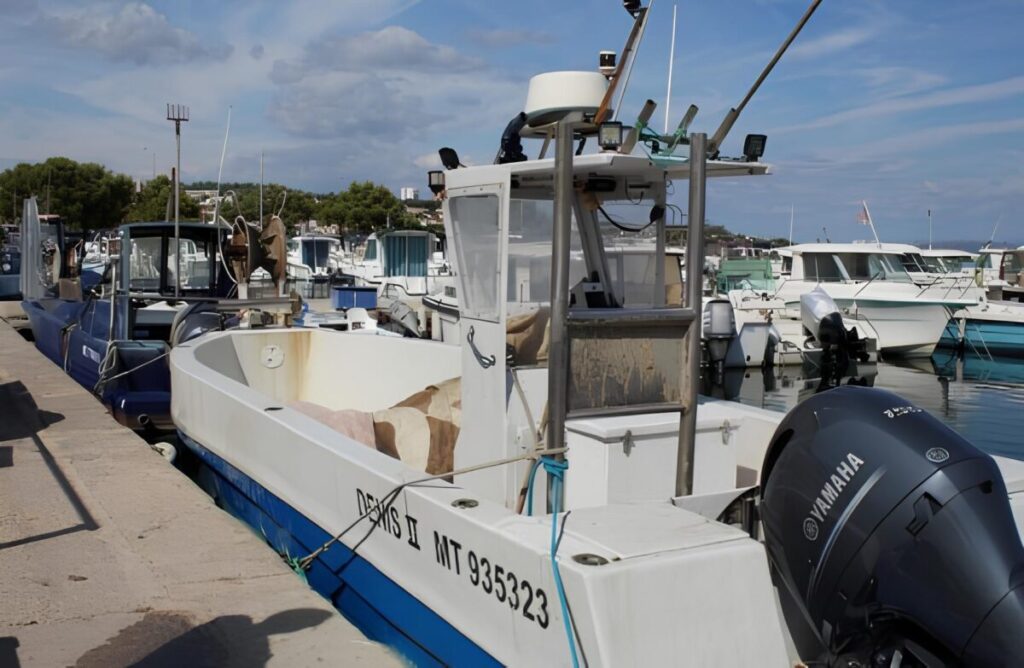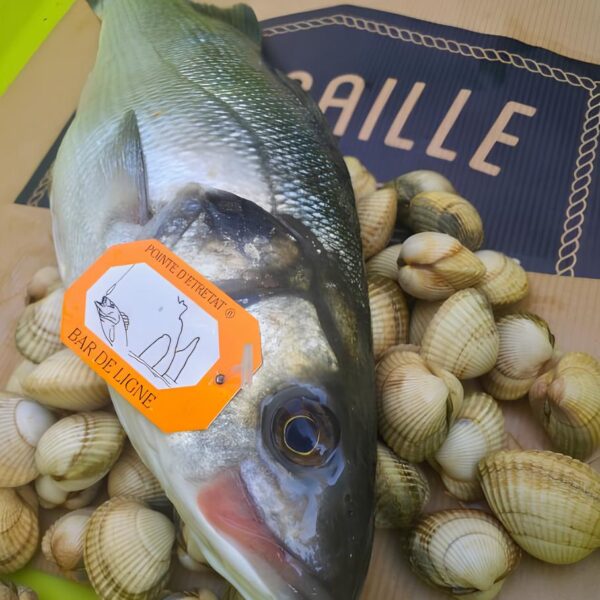Challenges for Biodiversity #3
Poiscaille is a short supply chain that reconciles fresh fish supply, sustainable fishing, and fair compensation for fishermen. The platform offers seafood boxes on subscription throughout France. The fish are caught a maximum of 72 hours before delivery. Fishermen are paid a fixed price annually, higher than the market rate. This is a way to combat the precariousness of this profession and, ultimately, overfishing.
With a neck reddened by endless hours in the sun, Ghislain is one of those for whom the sea air is a visceral need. “When it’s nice out and I can’t be at sea, I feel frustrated,” he smiles, his eyes fixed on his boat. It may come from his genes: an uncle who is a fisherman, a mother who is a fishmonger… Who knows? So much so that at 20, he decides to make it his profession. First working for employers, then for himself starting in 2012, navigating between the Étang de Berre, the Gulf of Fos, and the open waters of the Rhône where he catches mullets, bass, and tuna.
He named his boat Denis II. “It’s my father’s name. He worked hard. I want to do the same,” he says. And indeed, Ghislain does not skimp on effort. Working at sea is tough. The salt, the wind, the cold, the humidity, the sun. Not really any holidays or weekends, unless the weather demands it. Night work. Days of 18 hours. And an income that is also tempestuous.
“At first, I worked 99% for wholesalers in Marseille. It went well. But it’s a market where prices vary a lot depending on the catch.”
Then one day, by chance during a Google search, he comes across the website of Poiscaille. A few meetings later, Ghislain regularly supplies the platform, which now offers him a solid outlet, stabilizing his income.
A Profession with Fragile Incomes
Poiscaille is the brainchild of Charles Guirriec. He knows the sea very well. Born in Bordeaux, he trained as a fisheries engineer before joining a consulting firm working for the Secretary of State in charge of fishing. Later, he became an engineer for that same administration, focusing on innovation in boats.
During these experiences, he becomes aware of the reality of fishing professions. “It’s one of the most unpredictable activities there is,” he explains. “The weather decides when we go out. We don’t know if the fish will be there. And we don’t control the prices, which are set by an auction.” So to limit risks, one solution: maximize the volumes caught. “This allows us to cover costs in case of low prices. And to make a killing in the opposite case.”
Except that, as Ghislain says, “the sea is not a store.” And overfishing has deleterious effects on marine ecosystems.
Overfishing Affects 21% of Species
The Ifremer (French Research Institute for Exploitation of the Sea) indicates that overfishing concerns 21% of fish populations. Not to mention the 27 million tons of individuals that are caught each year unintentionally and thrown back dead into the sea.
Industrial overfishing profoundly disrupts food chains. Lacking predator fish, jellyfish proliferate and destroy certain species. Seabirds lose part of their food source. Biodiversity collapses, and with it, the oceans' capacity to absorb greenhouse gases.
A vicious circle that Charles Guirriec aims to break at his level by promoting more ethical and sustainable fishing. With the idea that “if fishermen earn more for a kilogram of fish caught, they might be encouraged to fish less.”
The AMAP of the Sea
Inspired by Associations for the Maintenance of Peasant Agriculture (AMAP) of which he is a supporter, Charles Guirriec then imagines a box of fish that would be delivered regularly to homes or collection points, on subscription. Boxes sold at a fixed price regardless of their contents, whether it’s lobster or mackerel.
In the box, products that meet three adjectives: fresh, sustainable, and ethical. “Fresh” applies to fish that have been caught a maximum of 72 hours before delivery. Often compared to one or even two weeks for fish bought in large retail or from certain fishmongers.
“Sustainable” means that the use of dredging and trawling - which concerns 70% of the fish consumed in France - is banned. Instead, small boats whose sailors - few in number - opt for so-called passive methods.
Finally, by promising an “ethical” offer, the company ensures that its fishermen are paid a fixed price annually, which protects them from market fluctuations. And overall, the price is at least 20% higher than the market rate. A way to reward the efforts (gutting the fish, icing, filming) of fishermen to ensure the quality of the products.
“For a bass, we will pay the fisherman 22 euros per kilo, whether it’s worth 10 or 40 euros on the market,” assures Charles Guirriec. “But the biggest difference is made on lesser-known fish.” And Ghislain can testify: his mullet (Mugil cephalus), which despite its fine taste has a bad reputation, sells for 1 to 3 euros per kilo at the wholesale market. Poiscaille buys it from him at 6 euros. So much so that he has chosen to reduce the volumes caught: “I prefer to spend more time gutting, icing, and filming them rather than killing a lot of fish.”
A Work of Education
Founded in 2014, the company now has 80 employees, 240 partner fishermen, and 21,000 subscribers who pick up their fish from 1,500 partner collection points.
This development is conditioned by the entrepreneur's desire for a real impact on overfishing. “We want to have scientific results that tell us we are contributing to improving the state of fish stocks.” But already, Charles Guirriec is pleased: “a third of my fishermen fish less thanks to Poiscaille.”
To make its voice heard against the striking power of industrial fishing, Poiscaille wants to refine its model. Reduce its packaging, which is not easy when it comes to transporting fish and shellfish. And convince an even broader audience. “We are starting to offer canned fish, smoked fish at our collection points, for people who may not necessarily want to go online.” Offers at 10 euros (compared to a minimum of 19 euros today) are also being considered, associated with significant educational work. So that sustainably eating seafood products is no longer the privilege of a few insiders. And that our iodized pleasures are not incompatible with the preservation of the oceans.

Featured Photo: Poiscaille boxes offer a wide selection of products @Poiscaille
